63 start with G start with G

In the first decade of the twenty-first century, video games are an integral part of global media culture, rivaling Hollywood in revenue and influence. No longer confined to a subculture of adolescent males, video games today are played by adults around the world. At the same time, video games have become major sites of corporate exploitation and military recruitment.
In Games of Empire, Nick Dyer-Witheford and Greig de Peuter offer a radical political critique of such video games and virtual environments as Second Life, World of Warcraft, and Grand Theft Auto, analyzing them as the exemplary media of Empire, the twenty-first-century hypercapitalist complex theorized by Michael Hardt and Antonio Negri. The authors trace the ascent of virtual gaming, assess its impact on creators and players alike, and delineate the relationships between games and reality, body and avatar, screen and street.
Games of Empire forcefully connects video games to real-world concerns about globalization, militarism, and exploitation, from the horrors of African mines and Indian e-waste sites that underlie the entire industry, the role of labor in commercial game development, and the synergy between military simulation software and the battlefields of Iraq and Afghanistan exemplified by Full Spectrum Warrior to the substantial virtual economies surrounding World of Warcraft, the urban neoliberalism made playable in Grand Theft Auto, and the emergence of an alternative game culture through activist games and open-source game development.
Rejecting both moral panic and glib enthusiasm, Games of Empire demonstrates how virtual games crystallize the cultural, political, and economic forces of global capital, while also providing a means of resisting them.
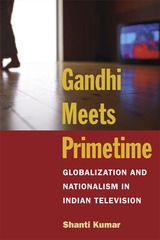
Kumar argues that India's hybrid national identity is manifested in the discourses found in this variety of empirical sources. He deconstructs representations of Mahatma Gandhi as the Father of the Nation on the state-sponsored network Doordarshan and those found on Rupert Murdoch's STAR TV network. The book closely analyzes print advertisements to trace the changing status of the television set as a cultural commodity in postcolonial India and examines publicity brochures, promotional materials and programming schedules of Indian-language networks to outline the role of vernacular media in the discourse of electronic capitalism. The empirical evidence is illuminated by theoretical analyses that combine diverse approaches such as cultural studies, poststructuralism and postcolonial criticism.

Geopolitical Economy radically reinterprets the historical evolution of the world order, as a multi-polar world emerges from the dust of the financial and economic crisis.
Radhika Desai offers a radical critique of the theories of US hegemony, globalisation and empire which dominate academic international political economy and international relations, revealing their ideological origins in successive failed US attempts at world dominance through the dollar.
Desai revitalizes revolutionary intellectual traditions which combine class and national perspectives on ‘the relations of producing nations’. At a time of global upheavals and profound shifts in the distribution of world power, Geopolitical Economy forges a vivid and compelling account of the historical processes which are shaping the contemporary international order.
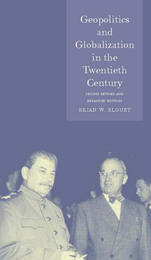
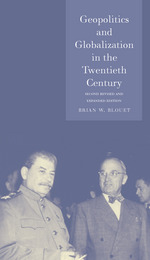
Geopolitics and Globalization in the Twentieth Century looks at the struggle between the processes of globalization and the forces of geopolitics over the last 150 years. The twentieth century witnessed conflicts between geopolitical states who wanted to close off and control land, resources, and population—like Nazi Germany and the former Soviet Union—and globalizing ones who wished to open up the world to the free flow of ideas, goods and services—like Britain and America. Geopolitics and Globalization describes and analyzes the tug-of-war between these two tendencies, the results of which have determined the shape and behavior of the world we live in today.
Beginning his survey in the late nineteenth century, Brian W. Blouet, in this revised and expanded second edition, brings his analysis up to the present day, when communication technologies are no longer land- or sea-based, and thus render globalization nearly inevitable.
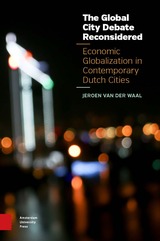
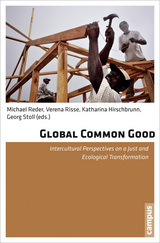
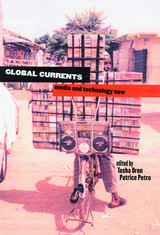
Rhetoric about media technology tends to fall into two extreme categories: unequivocal celebration or blanket condemnation. This is particularly true in debate over the clash of values when first world media infiltrate third world audiences.
Bringing together the best new work on contemporary media practices, technologies, and policies, the essayists in Global Currents argue that neither of these extreme views accurately represents the role of media technology today. New ways of thinking about film, television, music, and the internet demonstrate that it is not only media technologies that affect the cultures into which they are introduced—it is just as likely that the receiving culture will change the media.
Topics covered in the volume include copyright law and surveillance technology, cyber activism in the African Diaspora, transnational monopolies and local television industries, the marketing and consumption of “global music,” “click politics” and the war on Afghanistan, the techno-politics of distance education, artificial intelligence and global legal institutions, and traveling and “squatting” in digital space. Balanced between major theoretical positions and original field research, the selections address the political and cultural meanings that surround and configure new technologies.
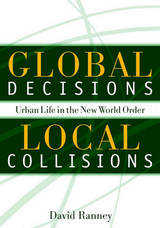
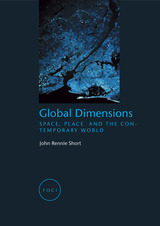
John Rennie Short disagrees with this interpretation, arguing that the world today actually thrives on local differences and that a global polity tends to reinforce – not repress – the power of individual nation-states. He insists that globalization is not so much replacing difference with sameness as providing opportunities for new interactions between spaces and locations, new connections between the global and the local, new social landscapes and more diversity rather than less.

William I. Robinson, University of California-Santa Barbara
"[An] acute and revealing examination of the economic difficulties facing the American empire."
Ronnie D. Lipschutz, Professor of Politics, University of California, Santa Cruz
"Indispensable for students of international polical economy and a must for political activists." Professor Elmar Altvater, Department of Political Science, Free University, Berlin
Like many buzzwords, 'global governance' is as poorly understood as it is popular. In contrast to most mainstream accounts, this book examines global economic governance as an integral moment of contemporary capitalism -- presenting a critical insight into its real nature and the interests that it serves.
This book begins by asking what has not been discussed in the mainstream debates and why. Drawing on a Marxist perspective, Soederberg explores neglected issues including transnational debt and the increasingly coercive nature of US aid to so-called Œfailed states'. Soederberg argues that mainstream understandings fail to engage with the wider contradictions that characterise global capitalism. In consequence, there is no explanation of the changing nature of American empire and capitalist power in the world. Furthermore, Soederberg argues that global governance acts to normalise and legitimise increasingly austere forms of capitalist expansion, which may be regarded as a deepening and broadening of neoliberalism.
Susanne Soederberg is a Canada Research Chair in Global Political Economy and Associate Professor in International Development Studies at Queen's University, Kingston, Canada. She is author of The Politics of the New International Financial Architecture: Reimposing Neoliberal Domination in the Global South (Zed, 2005).

The goals of health and human security are fundamentally valued in all societies, yet the breadth of their interconnections are not properly understood. This volume explores the evolving relationship between health and security in today's interdependent world, and offers policy guidelines for global health action.
This volume underscores three basic principles. First, recent developments in the changing security landscape present enormous challenges for human security and global health. Second, although the connections between health and security are long-standing, the current context of new conflicts, pervasive poverty, and accelerating global flows has brought the fields closer together. Finally, a human security approach dependent upon individual and collective action can identify new strategies for meeting the goals of global health and security.
The distinguished contributions to this volume were commissioned by Harvard University's Global Equity Initiative, a research unit supporting the work of the International Commission on Human Security.

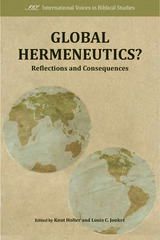
A collection of essays from the International Cooperation Initiative of the Society of Biblical Literature
This first volume in the International Voices in Biblical Studies series stimulates and facilitates a global hermeneutic in which centers and margins fade. The collection explores the global context within which biblical studies and interpretation take place, includes three case studies from different regions, and reflections on the consequences of global hermeneutics on biblical interpretation and on translation.Features
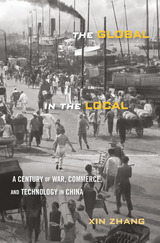
The story of globalization in the nineteenth and early twentieth centuries as experienced by ordinary people in the Chinese river town of Zhenjiang.
Fear swept Zhenjiang as British soldiers gathered outside the city walls in the summer of 1842. Already suspicious of foreigners, locals had also heard of the suffering the British inflicted two months earlier, in Zhapu. A wave of suicides and mercy killings ensued: rather than leave their families to the invaders, hundreds of women killed themselves and their children or died at the hands of male family members. British observers decried an “Asian culture” of ritual suicide. In reality, the event was sui generis—a tragic result of colliding local and global forces in nineteenth-century China.
Xin Zhang’s groundbreaking history examines the intense negotiations between local societies and global changes that created modern China. In the nineteenth and early twentieth centuries, world-historic political, economic, and technological developments transformed the textures of everyday life in places like Zhenjiang, a midsize river town in China’s prosperous Lower Yangzi region. Drawing on rare primary sources, including handwritten diaries and other personal writings, Zhang offers a ground-level view of globalization in the city. We see civilians coping with the traumatic international encounters of the Opium War; Zhenjiang brokers bankrolling Shanghai’s ascendance as a cosmopolitan commercial hub; and merchants shipping goods to market, for the first time, on steamships.
Far from passive recipients, the Chinese leveraged, resisted, and made change for themselves. Indeed, The Global in the Local argues that globalization is inevitably refracted through local particularities.
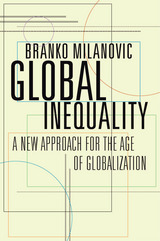
Winner of the Bruno Kreisky Prize, Karl Renner Institut
A Financial Times Best Economics Book of the Year
An Economist Best Book of the Year
A Livemint Best Book of the Year
One of the world’s leading economists of inequality, Branko Milanovic presents a bold new account of the dynamics that drive inequality on a global scale. Drawing on vast data sets and cutting-edge research, he explains the benign and malign forces that make inequality rise and fall within and among nations. He also reveals who has been helped the most by globalization, who has been held back, and what policies might tilt the balance toward economic justice.
“The data [Milanovic] provides offer a clearer picture of great economic puzzles, and his bold theorizing chips away at tired economic orthodoxies.”
—The Economist
“Milanovic has written an outstanding book…Informative, wide-ranging, scholarly, imaginative and commendably brief. As you would expect from one of the world’s leading experts on this topic, Milanovic has added significantly to important recent works by Thomas Piketty, Anthony Atkinson and François Bourguignon…Ever-rising inequality looks a highly unlikely combination with any genuine democracy. It is to the credit of Milanovic’s book that it brings out these dangers so clearly, along with the important global successes of the past few decades.
—Martin Wolf, Financial Times
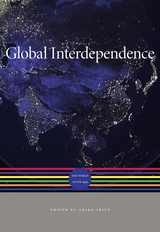
Global Interdependence provides a new account of world history from the end of World War II to the present, an era when transnational communities began to challenge the long domination of the nation-state. In this single-volume survey, leading scholars elucidate the political, economic, cultural, and environmental forces that have shaped the planet in the past sixty years.
Offering fresh insight into international politics since 1945, Wilfried Loth examines how miscalculations by both the United States and Soviet Union brought about a Cold War conflict that was not necessarily inevitable. Thomas Zeiler explains how American free-market principles spurred the creation of an entirely new economic order—a global system in which goods and money flowed across national borders at an unprecedented rate, fueling growth for some nations while also creating inequalities in large parts of the Middle East, Latin America, and Africa. From an environmental viewpoint, John McNeill and Peter Engelke contend that humanity has entered a new epoch, the Anthropocene era, in which massive industrialization and population growth have become the most powerful influences upon global ecology. Petra Goedde analyzes how globalization has impacted indigenous cultures and questions the extent to which a generic culture has erased distinctiveness and authenticity. She shows how, paradoxically, the more cultures blended, the more diversified they became as well.
Combining these different perspectives, volume editor Akira Iriye presents a model of transnational historiography in which individuals and groups enter history not primarily as citizens of a country but as migrants, tourists, artists, and missionaries—actors who create networks that transcend traditional geopolitical boundaries.
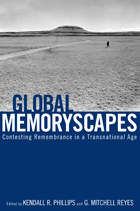
The essays contained within the volume--by scholars from a wide range of disciplines including American studies, art history, political science, psychology, and sociology--each engage a particular instance of the practices of memory as they are complicated by globalization.
Subjects include the place of nostalgia in post-Yugoslavia Serbian national memory, Russian identity after the collapse of the Soviet Union, political remembrance in South Africa’s Truth and Reconciliation Commissions, the role of Chilean mass media in forging national identity following the arrest of Augusto Pinochet, American debates over memorializing Japanese internment camps, and how the debate over the Iraq war is framed by memories of opposition to the Vietnam War.

Over the past century, Israel has been transformed from an agricultural colony, to a welfare-warfare state, to a globally integrated "market economy" characterised by great income disparities. What lies behind this transformation? In order to understand capitalist development, argue Bichler and Nitzan, we need to break the artificial separation between "economics" and "politics", and think of accumulation itself as "capitalisation of power". Applying this concept to Israel, they reveal the big picture that never makes it to the news. Diverse processes – such as regional conflicts and energy crises, ruling class formation and dominant ideology, militarism and dependency, inflation and recession, the politics of high-technology and the transnationalisation of ownership – are all woven into a single story. The result is a fascinating account of one of the world’s most volatile regions.
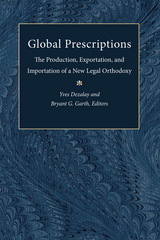
Comprised of two sections, the volume first develops theoretical perspectives key to an understanding of the production and impact of new "global legal prescriptions." The second part shifts attention to the national importation of these legal orthodoxies. The scholars provide a diverse set of sophisticated approaches, both to the circumstances promoting the production of these prescriptions and to the limitations of the prescriptions in the different national settings. Thus, Global Prescriptions provides a unique treatment for readers interested in globalization generally or the potential spread of the "rule of law" in particular.
This volume will intrigue scholars and students interested in a political science, economics, history, anthropology, law, and sociology.
Contributors are Jeremy Adelman, Robert Boyer, Elizabeth Heger Boyle, Miguel Angel Centeno, Heinz Klug, Larissa Adler Lomnitz, John W. Meyer, Setsuo Miyazawa, Hiroshi Otsuka, Rodrigo Salazar, Kathryn Sikkink, Anne-Marie Slaughter, and Catalina Smulovitz.
Yves Dezalay is Director of Research, National Center for Scientific Research, Paris. Bryant G. Garth is Director of the American Bar Foundation.
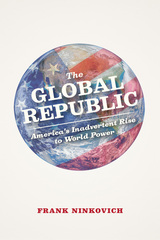
One of the preeminent intellectual historians of our time, Ninkovich delivers here his most ambitious and sweeping book to date. He argues that historically the United States has been driven not by a belief in its destiny or its special character but rather by a need to survive the forces of globalization. He builds the powerful case that American foreign policy has long been based on and entangled in questions of global engagement, while also showing that globalization itself has always been distinct from—and sometimes in direct conflict with—what we call international society.
In the second half of the twentieth century, the United States unexpectedly stumbled into the role of global policeman and was forced to find ways to resolve international conflicts that did not entail nuclear warfare. The United States's decisions were based less in notions of exceptionalism and more in a need to preserve and expand a flourishing global society that had become essential to the American way of life.
Sure to be controversial, The Global Republic compellingly and provocatively counters some of the deepest and most common misconceptions about America’s history and its place in the world.

Tracing the liberal state structure back to the closing stages of the English Civil War and settlement in North America, it argues that the rise of the English-speaking West has created rivalries between contender states that are never entirely put to rest. With each round of Western expansion, new rivalries are created.
Offering a truly global analysis that covers every area of the world - from Europe and America to China, the Middle East, Latin America and Russia -- he analyses the development of international relations post WWII, and questions whether the neoliberal project and its human rights ideology have collapsed back into authoritarianism under the guise of the 'war on terror'.

Nowhere is the conflict over rule setting more evident than in the simmering “standards wars” over the rules that define quality and enable the adjudication of disputes. In Global Rivalries, Amy A. Quark explores the questions of how rules are made, who makes them, and how they are enforced, using the lens of cotton—a simple commodity that has become a poignant symbol of both the crisis of Western rule making power and the potential for powerful new rivals to supplant it. Quark traces the strategies for influencing rule making processes employed not only by national governments but also by transnational corporations, fiber scientists, and trade associations from around the globe. Quark analyzes the efficacy of their approaches and the implications for more marginal actors in the cotton trade, including producers in West Africa.

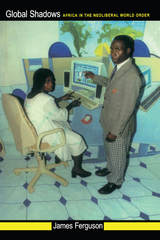
In Global Shadows the renowned anthropologist James Ferguson moves beyond the traditional anthropological focus on local communities to explore more general questions about Africa and its place in the contemporary world. Ferguson develops his argument through a series of provocative essays which open—as he shows they must—into interrogations of globalization, modernity, worldwide inequality, and social justice. He maintains that Africans in a variety of social and geographical locations increasingly seek to make claims of membership within a global community, claims that contest the marginalization that has so far been the principal fruit of “globalization” for Africa. Ferguson contends that such claims demand new understandings of the global, centered less on transnational flows and images of unfettered connection than on the social relations that selectively constitute global society and on the rights and obligations that characterize it.
Ferguson points out that anthropologists and others who have refused the category of Africa as empirically problematic have, in their devotion to particularity, allowed themselves to remain bystanders in the broader conversations about Africa. In Global Shadows, he urges fellow scholars into the arena, encouraging them to find a way to speak beyond the academy about Africa’s position within an egregiously imbalanced world order.
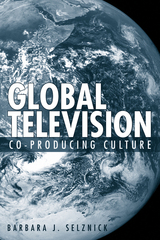
The face of U.S. television broadcasting is changing in ways that are both profound and subtle. Global Television uncovers the particular processes by which the international circulation of culture takes place, while addressing larger cultural issues such as identity formation.
Focusing on how the process of internationally made programming such as Highlander: The Series and The Odyssey—amusingly dubbed “Europudding” and “commercial white bread”—are changing television into a transnational commodity, Barbara Selznick considers how this mode of production—as a means by which transnational television is created—has both economic rewards and cultural benefits as well as drawbacks.
Global Television explores the ways these international co-productions create a “global” culture as well as help form a national identity. From British “brand” programming (e.g, Cracker) that airs on A&E in the U.S. to children’s television programs such as Plaza Sesamo, and documentaries, Selznick indicates that while the style, narrative, themes and ideologies may be interesting, corporate capitalism ultimately affects and impacts these programs in significant ways.
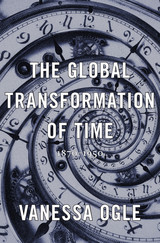
As new networks of railways, steamships, and telegraph communications brought distant places into unprecedented proximity, previously minor discrepancies in local time-telling became a global problem. Vanessa Ogle’s chronicle of the struggle to standardize clock times and calendars from 1870 to 1950 highlights the many hurdles that proponents of uniformity faced in establishing international standards.
Time played a foundational role in nineteenth-century globalization. Growing interconnectedness prompted contemporaries to reflect on the annihilation of space and distance and to develop a global consciousness. Time—historical, evolutionary, religious, social, and legal—provided a basis for comparing the world’s nations and societies, and it established hierarchies that separated “advanced” from “backward” peoples in an age when such distinctions underwrote European imperialism.
Debates and disagreements on the varieties of time drew in a wide array of observers: German government officials, British social reformers, colonial administrators, Indian nationalists, Arab reformers, Muslim scholars, and League of Nations bureaucrats. Such exchanges often heightened national and regional disparities. The standardization of clock times therefore remained incomplete as late as the 1940s, and the sought-after unification of calendars never came to pass. The Global Transformation of Time reveals how globalization was less a relentlessly homogenizing force than a slow and uneven process of adoption and adaptation that often accentuated national differences.



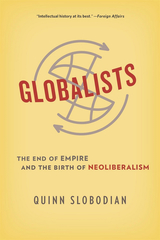
George Louis Beer Prize Winner
Wallace K. Ferguson Prize Finalist
A Marginal Revolution Book of the Year
“A groundbreaking contribution…Intellectual history at its best.”
—Stephen Wertheim, Foreign Affairs
Neoliberals hate the state. Or do they? In the first intellectual history of neoliberal globalism, Quinn Slobodian follows a group of thinkers from the ashes of the Habsburg Empire to the creation of the World Trade Organization to show that neoliberalism emerged less to shrink government and abolish regulations than to redeploy them at a global level. It was a project that changed the world, but was also undermined time and again by the relentless change and social injustice that accompanied it.
“Slobodian’s lucidly written intellectual history traces the ideas of a group of Western thinkers who sought to create, against a backdrop of anarchy, globally applicable economic rules. Their attempt, it turns out, succeeded all too well.”
—Pankaj Mishra, Bloomberg Opinion
“Fascinating, innovative…Slobodian has underlined the profound conservatism of the first generation of neoliberals and their fundamental hostility to democracy.”
—Adam Tooze, Dissent
“The definitive history of neoliberalism as a political project.”
—Boston Review
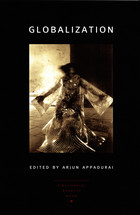
Seeking an alternative to the dead-end debate between those who see globalization as a phenomenon wholly without precedent and those who see it simply as modernization, imperialism, or global capitalism with a new face, the contributors seek to illuminate how space and time are transforming each other in special ways in the present era. They examine how this complex transformation involves changes in the situation of the nation, the state, and the city. While exploring distinct regions—China, Africa, South America, Europe—and representing different disciplines and genres—anthropology, literature, political science, sociology, music, cinema, photography—the contributors are concerned with both the political economy of location and the locations in which political economies are produced and transformed. A special strength of the collection is its concern with emergent styles of subjectivity, citizenship, and mobilization and with the transformations of state power through which market rationalities are distributed and embodied locally.
Contributors. Arjun Appadurai, Jean François Bayart, Jérôme Bindé, Néstor García Canclini, Leo Ching, Steven Feld, Ralf D. Hotchkiss, Wu Hung, Andreas Huyssen, Boubacar Touré Mandémory, Achille Mbembe, Philipe Rekacewicz, Saskia Sassen, Fatu Kande Senghor, Seteney Shami, Anna Tsing, Zhang Zhen

Tomlinson begins this ambitious project by studying the relationship between globalization and contemporary culture, explaining the importance of time and space concerns, cultural imperialism, "deterritorialization," the impact of the media and communication technologies, and the possible growth of more cosmopolitan culture. We come to understand how someone may face unemployment as a result of downsizing decisions made at a company's head office on another continent, or how the food we find in our grocery stores is radically different today from twenty years ago. He discusses the uneven nature of the experience of global modernity in relation to first and third world countries, and concludes that a genuinely cosmopolitan culture is unlikely to emerge unless we respect cultural differences and share a common sense of commitment about the world.

This book explores the effects of global socio-economic forces on the domestic policies and administrative institutions of Japan and the United States, and it explains how these global factors have shifted power and authority downward from the national government to subnational governments.
This major comparative study comprises ten pairs of essays written by leading Japanese and American scholars on parallel public policy issues, institutional patterns, and intergovernmental relations in Japan and the United States, all set in the context of globalization and its impact on decentralization in each country. The twenty contributors and the editors provide new insights into the domestic consequences of global interdependence by examining emerging strategies for dealing with environmental concerns, urban problems, infrastructure investments, financial policies, and human services issues.
An important study of the changing global setting, Globalization and Decentralization emphasizes the innovative and adaptive roles played by Japanese and American state, provincial, regional, and local governments in responding to the dramatic economic and political power shifts created by the new world order.
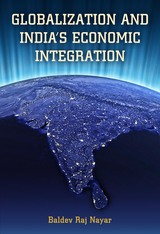
A common critique of globalization is that it causes economic segmentation and even disintegration of the national economy. Quite to the contrary, Baldev Raj Nayar provides a thorough empirical treatment of India’s political economy that challenges this critique by demonstrating that, on balance, both state and market have functioned to attenuate such a disintegrative impact and to accentuate economic integration. The active role of the Indian state in the areas of economic planning, fiscal federalism, and tax reform has resulted in improved economic integration and not increased segmentation. Similarly, his investigation of trade, investment, entrepreneurship, and migration suggests tendencies inherent in the market in favor of economic integration, especially when assisted by the state. While globalization has its benefits, such as higher economic growth, and costs, such as external shocks, Nayar’s findings show that India has benefited from globalization more than it has been victimized by it.
Globalization and India’s Economic Integration shows how globalization’s pressures favoring efficiency paradoxically induced the state to push for consolidation on a pan-Indian scale in the area of fiscal federalism and to advance the cause of the common market through reforming the indirect tax system; meanwhile, the state has pressed forward with social inclusiveness as never before in its economic planning. For another, the market, too, has been instrumental, because of its widened scope and its inherently expanding character, in strengthening economic integration through trade expansion, diffusion of industry, and increased inter-state migration. Nayar’s groundbreaking work will interest students, scholars, and specialists of India, South Asia, globalization, and political economy.
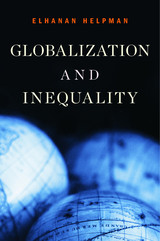
One of the world’s leading experts on international trade explains that we must look beyond globalization to explain rising inequality.
Globalization is not the primary cause of rising inequality. This may come as a surprise. Inequality within nations has risen steadily in recent decades, at a time when countries around the world have eased restrictions on the movement of goods, capital, and labor. Many assume a causal relationship, which has motivated opposition to policies that promote freer trade. Elhanan Helpman shows, however, in this timely study that this assumption about the effects of globalization is more myth than fact.
Globalization and Inequality guides us through two decades of research about the connections among international trade, offshoring, and changes in income, and shows that the overwhelming conclusion of contemporary research is that globalization is responsible for only a small rise in inequality. The chief causes remain difficult to pin down, though technological developments favoring highly skilled workers and changes in corporate and public policies are leading suspects. As Helpman makes clear, this does not mean that globalization creates no problems. Critics may be right to raise concerns about such matters as cultural autonomy, child labor, and domestic sovereignty. But if we wish to curb inequality while protecting what is best about an interconnected world, we must start with a clear view of what globalization does and does not do and look elsewhere to understand our troubling and growing divide.

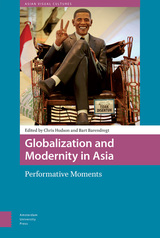

Globalization and New Geographies of Conservation makes four important arguments about the recent coupling of conservation and globalization that is reshaping the place of nature in human-environmental change. First, it has led to an unprecedented number of spatial arrangements whose environmental management goals and prescribed activities vary along a spectrum from strict biodiversity protection to sustainable utilization involving agriculture, food production, and extractive activities. Conservation and globalization are also leading, by necessity, to new scales of management in these activities that rely on environmental science, thus shifting the spatial patterning of humans and the environment. This interaction results, as well, in the unprecedented importance of boundaries and borders; transnational border issues pose both opportunities and threats to global conservation proposed by organizations and institutions that are themselves international. Lastly, Globalization and New Geographies of Conservation argues that the local level has been integral to globalization, while the regional level is often eclipsed at the peril of the successful implementation of conservation and management programs.
Bridging the gap between geography and life science, Globalization and New Geographies of Conservation will appeal to a broad range of students of the environment, conservation planning; biodiversity management, and development and globalization studies.
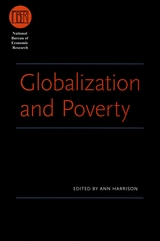
Over the past two decades, the percentage of the world’s population living on less than a dollar a day has been cut in half. How much of that improvement is because of—or in spite of—globalization? While anti-globalization activists mount loud critiques and the media report breathlessly on globalization’s perils and promises, economists have largely remained silent, in part because of an entrenched institutional divide between those who study poverty and those who study trade and finance.
Globalization and Poverty bridges that gap, bringing together experts on both international trade and poverty to provide a detailed view of the effects of globalization on the poor in developing nations, answering such questions as: Do lower import tariffs improve the lives of the poor? Has increased financial integration led to more or less poverty? How have the poor fared during various currency crises? Does food aid hurt or help the poor?
Poverty, the contributors show here, has been used as a popular and convenient catchphrase by parties on both sides of the globalization debate to further their respective arguments. Globalization and Poverty provides the more nuanced understanding necessary to move that debate beyond the slogans.

A number of the essays bring to light the formative but not unproblematic influence of African American identity on other populations within the black diaspora. Among these are an examination of the impact of “black America” on racial identity and politics in mid-twentieth-century Liverpool and an inquiry into the distinctive experiences of blacks in Canada. Contributors investigate concepts of race and space in early-twenty-first century Harlem, the experiences of trafficked Nigerian sex workers in Italy, and the persistence of race in the purportedly non-racial language of the “New South Africa.” They highlight how blackness is consumed and expressed in Cuban timba music, in West Indian adolescent girls’ fascination with Buffy the Vampire Slayer, and in the incorporation of American rap music into black London culture. Connecting race to ethnicity, gender, sexuality, nationality, and religion, these essays reveal how new class economies, ideologies of belonging, and constructions of social difference are emerging from ongoing global transformations.
Contributors. Robert L. Adams, Lee D. Baker, Jacqueline Nassy Brown, Tina M. Campt, Kamari Maxine Clarke, Raymond Codrington, Grant Farred, Kesha Fikes, Isar Godreau, Ariana Hernandez-Reguant, Jayne O. Ifekwunigwe, John L. Jackson Jr., Oneka LaBennett, Naomi Pabst, Lena Sawyer, Deborah A. Thomas
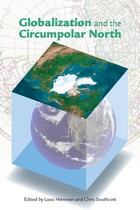
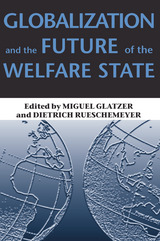
In the last quarter of the twentieth century, the global political economy has undergone a profound transformation. Democracy has swept the globe, and both rich and developing nations must compete in an increasingly integrated world economy.
How are social welfare policies being affected by this wave of economic globalization? Leading researchers explore the complex question in this new comparative study. Shifting their focus from the more commonly studied, established welfare states of northwestern Europe, the authors of Globalization and the Future of the Welfare State examine policy development in the middle-income countries of southern and eastern Europe, Latin America, Russia, and East Asia.
Previous investigations into the effects of globalization on welfare states have generally come to one of two conclusions. The first is that a global economy undermines existing welfare states and obstructs new developments in social policy, as generous provisions place a burden on a nation's resources and its ability to compete in the international marketplace. In contrast, the second builds on the finding that economic openness is positively correlated with greater social spending, which suggests that globalization and welfare states can be mutually reinforcing.
Here the authors find that globalization and the success of the welfare state are by no means as incompatible as the first view implies. The developing countries analyzed demonstrate that although there is great variability across countries and regions, domestic political processes and institutions play key roles in managing the disruptions wrought by globalization.

In the American federal system, states actively compete for jobs, business investment, and factory locations. Labor costs have played an important role in such interstate competition since the days of the pre-Civil War plantation economy. In recent years, however, global economic trends have put added pressures on businesses and government to reduce labor costs. At least, that is what most politicians, the media, and the business community believe.
Globalization and the Politics of Pay examines the economic, political, and social causes and consequences of declining wages in the United States. It challenges the conventional wisdom that globalization is to blame for the decline in workers' earnings. Susan B. Hansen presents a comprehensive analysis of the many factors affecting labor costs and concludes that many of them result from choices made by the states themselves through the laws and policies they enact. In addition, free-market ideologies and low voter turnout have had greater effects in keeping wages down than globalization. In fact, foreign trade and investment can actually result in higher pay in the state labor market.
In this rigorous yet surprising study, Hansen develops new measures of state and federal labor costs to test competing theories of the consequences of reducing wages and benefits. Most economists would argue that higher labor costs cause higher unemployment, and that reducing labor costs will lead to higher levels of job creation. But citizens and elected officials must weigh any employment gains in lower-wage jobs against slower state economic growth, declining personal income, and a less-competitive position in international trade. Cutting state labor costs is shown to have adverse social consequences, including family instability, high crime rates, poverty, and low voter turnouts. The book concludes with policy recommendations for state governments trying to balance their need for more jobs with policies to enhance productivity, living standards, social stability, and international competitiveness.
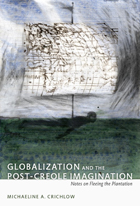
Engaging with the thought of Michel Foucault, Michel Rolph-Trouillot, Achille Mbembe, Henri Lefebvre, Margaret Archer, Saskia Sassen, Pierre Bourdieu, and others, Crichlow argues for understanding creolization as a continual creative remaking of past and present moments to shape the future. She draws on sociology, philosophy, postcolonial studies, and cultural studies to illustrate how national histories are lived personally and how transnational experiences reshape individual lives and collective spaces. Critically extending Bourdieu’s idea of habitus, she describes how contemporary Caribbean subjects remake themselves in and beyond the Caribbean region, challenging, appropriating, and subverting older, localized forms of creolization. In this book, Crichlow offers a nuanced understanding of how Creole citizens of the Caribbean have negotiated modern economies of power.

As the world transitions from an industrial society to an information society, agriculture has undergone a dramatic transformation. Food production in the twentieth century was transformed by three revolutions: first mechanical, then genetic, and finally chemical. Now, in the twenty-first century, agriculture is going through at least two more revolutions: an information technology revolution leading to precision farming, and a biotechnology revolution leading to genetically engineered crops.
Organized by Harvard University’s David Rockefeller Center for Latin American Studies with the collaboration of the Scientific Committee for Problems of the Environment, this interdisciplinary volume examines the impact of a variety of new technological, social, and economic trends on the rural environment.
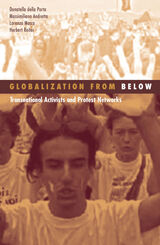
Presenting the first systematic empirical research on the global justice movement, Globalization from Below analyzes a movement from the viewpoints of the activists, organizers, and demonstrators themselves. The authors traveled to Genoa with anti-G8 protesters and collected data from more than 800 participants. A year later, they surveyed 2,400 activists at the European Social Forum in Florence. To understand how this cycle of global protest emerged, they examine the interactions between challengers and elites, and discuss how these new models of activism fit into current social movement work.
Globalization from Below places the protests within larger debates, revealing and investigating the forces that led to a clash between demonstrators and the Italian government, which responded with violence.
Donatella della Porta is professor of political science; Massimiliano Andretta is a researcher in political science and sociology; Lorenzo Mosca is a researcher in information and communication technologies; Herbert Reiter is a researcher in history, all at the European University Institute.
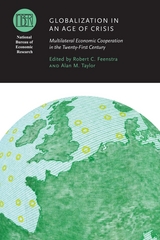
Prompted by these questions, Robert C. Feenstra and Alan M. Taylor have brought together top researchers with policy makers and practitioners whose contributions consider the ways in which the global economic order might address the challenges of globalization that have arisen over the last two decades and that have been intensified by the recent crisis. Chapters in this volume consider the critical linkages between issues, including exchange rates, global imbalances, and financial regulation, and plumb the political and economic outcomes of past policies for what they might tell us about the future of the global economic cooperation.
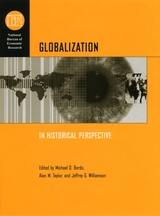
This volume collects eleven papers doing exactly that and more. The first group of essays explores how the process of globalization can be measured in terms of the long-term integration of different markets-from the markets for goods and commodities to those for labor and capital, and from the sixteenth century to the present. The second set of contributions places this knowledge in a wider context, examining some of the trends and questions that have emerged as markets converge and diverge: the roles of technology and geography are both considered, along with the controversial issues of globalization's effects on inequality and social justice and the roles of political institutions in responding to them. The final group of essays addresses the international financial systems that play such a large part in guiding the process of globalization, considering the influence of exchange rate regimes, financial development, financial crises, and the architecture of the international financial system itself.
This volume reveals a much larger picture of the process of globalization, one that stretches from the establishment of a global economic system during the nineteenth century through the disruptions of two world wars and the Great Depression into the present day. The keen analysis, insight, and wisdom in this volume will have something to offer a wide range of readers interested in this important issue.
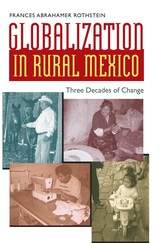
Winner, Society of the Anthropology of Work Book Prize, 2010
When the ever-intensifying global marketplace "modernizes" rural communities, who stands to gain? Can local residents most impacted by changes to their social fabric ever recover or even identify what has been lost?
Frances Abrahamer Rothstein uses thirty years of sustained anthropological fieldwork in the rural Mexican community of San Cosme Mazatecochco to showcase globalization's complexities and contradictions.
Rothstein's lucid work chronicles the changes in production, consumption, and social relations during three distinct periods: the Mexican "miracle," when economic development fueled mobility for a large segment of the population, including San Cosme's worker-peasants; the lost decade of the 1980s, when much of what had been gained was lost; and the recent period of trade liberalization and globalization, considered by many in Mexico and beyond as a panacea and a disaster at the same time.
After Mexico's textile industry decline in the late 1980s, some families of former textile workers in San Cosme opened home workshops—talleres—and a small-scale, textile-based economy took root. These families, who managed to prosper through their own trade and industry, demonstrate that those who rely on consumer demand for their livelihood need not always follow the dictate of the marketplace, but rather can position themselves assertively to influence alternative economic possibilities held close to their culture.
Employing rich ethnography and broad analysis, Rothstein focuses on how everyday life has been transformed by these processes, but shows also how important continuities with the past persist. She strikes a delicate balance between firmly grounded scientific study and a deep compassion for the subjects of her work, while challenging contemporary views of globalization and consumption.

Seeking an alternative to the dead-end debate between those who see globalization as a phenomenon wholly without precedent and those who see it simply as modernization, imperialism, or global capitalism with a new face, the contributors seek to illuminate how space and time are transforming each other in special ways in the present era. They examine how this complex transformation involves changes in the situation of the nation, the state, and the city. While exploring distinct regions—China, Africa, South America, Europe—and representing different disciplines and genres—anthropology, literature, political science, sociology, music, cinema, photography—the contributors are concerned with both the political economy of location and the locations in which political economies are produced and transformed. A special strength of the collection is its concern with emergent styles of subjectivity, citizenship, and mobilization and with the transformations of state power through which market rationalities are distributed and embodied locally.
Contributors. Arjun Appadurai, Jérome Bindé, Néstor García Canclini, Leo Ching, Steven Feld, Ralf D. Hotchkiss, Wu Hung, Andreas Huyssen, Boubacar Touré Mandémory, Achille Mbembe, Saskia Sassen, Fatu Kande Senghor, Seteney Shami, Anna Tsing, Zhang Zhen
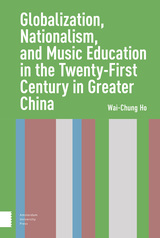

2013 Choice Outstanding Academic Title
“Supermax” prisons, conceived by the United States in the early 1980s, are typically reserved for convicted political criminals such as terrorists and spies and for other inmates who are considered to pose a serious ongoing threat to the wider community, to the security of correctional institutions, or to the safety of other inmates. Prisoners are usually restricted to their cells for up to twenty-three hours a day and typically have minimal contact with other inmates and correctional staff. Not only does the Federal Bureau of Prisons operate one of these facilities, but almost every state has either a supermax wing or stand-alone supermax prison.
The Globalization of Supermax Prisons examines why nine advanced industrialized countries have adopted the supermax prototype, paying particular attention to the economic, social, and political processes that have affected each state. Featuring essays that look at the U.S.-run prisons of Abu Ghraib and Guantanemo, this collection seeks to determine if the American model is the basis for the establishment of these facilities and considers such issues as the support or opposition to the building of a supermax and why opposition efforts failed; the allegation of human rights abuses within these prisons; and the extent to which the decision to build a supermax was influenced by developments in the United States. Additionally, contributors address such domestic matters as the role of crime rates, media sensationalism, and terrorism in each country’s decision to build a supermax prison.
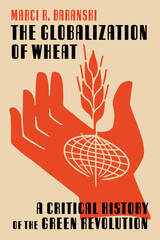
Nominee, 2023 Wallace Award, Agricultural History Society
In The Globalization of Wheat, Marci R. Baranski explores Norman Borlaug’s complicated legacy as godfather of the Green Revolution. Winner of the Nobel Peace Prize in 1970 for his role in fighting global hunger, Borlaug, an American agricultural scientist and plant breeder who worked for the Rockefeller Foundation, left a legacy that divides opinions even today. His high-yielding dwarf wheat varieties, known as miracle seeds, effectively doubled and tripled crop yields across the globe, from Kenya to India and Argentina to Mexico due to their wide adaptation. But these modern seeds also required expensive chemical fertilizers and irrigation, both of which were only available to wealthier farmers. Baranski argues that Borlaug’s new technologies ultimately privileged wealthier farmers, despite assurances to politicians that these new crops would thrive in diverse geographies and benefit all farmers. As large-scale monocultures replaced traditional farming practices, these changes were codified into the Indian wheat research system, thus limiting attention to traditional practices and marginal environments. In the shadow of this legacy, and in the face of accelerating climate change, Baranski brings new light to Borlaug’s role in a controversial concept in agricultural science.
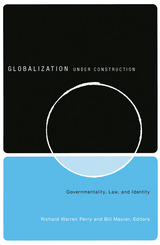
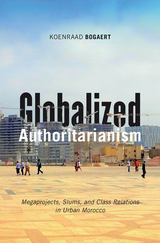
A rich investigation into Morocco’s urban politics
Over the past thirty years, Morocco’s cities have transformed dramatically. To take just one example, Casablanca’s medina is now obscured behind skyscrapers that are funded by global capital and encouraged by Morocco’s monarchy, which hopes to transform this city into a regional leader of finance and commerce. Such changes have occurred throughout Morocco. Megaprojects are redesigning the cityscapes of Rabat, Tangiers, and Casablanca, turning the nation’s urban centers into laboratories of capital accumulation, political dominance, and social control.
In Globalized Authoritarianism, Koenraad Bogaert links more abstract questions of government, globalization, and neoliberalism with concrete changes in the city. Bogaert goes deep beneath the surface of Morocco’s urban prosperity to reveal how neoliberal government and the increased connectivity engendered by global capitalism transformed Morocco’s leading urban spaces, opening up new sites for capital accumulation, creating enormous class divisions, and enabling new innovations in state authoritarianism. Analyzing these transformations, he argues that economic globalization does not necessarily lead to increased democratization but to authoritarianism with a different face, to a form of authoritarian government that becomes more and more a globalized affair.
Showing how Morocco’s experiences have helped produce new forms of globalization, Bogaert offers a bridge between in-depth issues of Middle Eastern studies and broader questions of power, class, and capital as they continue to evolve in the twenty-first century.
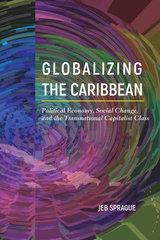
The beautiful Caribbean basin is fertile ground for a study of capitalism past and present. Transnational corporations move money and labor around the region, as national regulations are reworked to promote conditions benefiting private capital. Globalizing the Caribbean offers a probing account of the region’s experience of economic globalization while considering gendered and racialized social relations and the frequent exploitation of workers.
Jeb Sprague focuses on the social and material nature of this new era in the history of world capitalism. He combines an historical overview of capitalism in the region with theoretical analysis backed by case studies. Sprague elaborates upon the role of class formation and the restructuring of local states. He considers both U.S. hegemony, and how various upsurges from below and crises occur. He examines the globalization of the cruise ship and mining businesses, looks at the growth of migrant labor and reverse flow of remittances, and describes the evolving role of export processing and supranational associations. In doing so, Sprague shows how transnationally oriented elites have come to rule the Caribbean, and how capitalist globalization in the region occurs alongside shifting political, institutional, and organizational dynamics.

French and German tourists join Mexican migrant workers to venerate the image of the Virgin Mary at a strip mall in Florida; Latino gang members, deported from the United States to home countries they barely know, find Jesus in transnational churches; U.S. evangelicals use electronic media to preach a “neo liberal” gospel of wealth and health to landless peasants in remote indigenous villages in Guatemala. These are just some examples of how religion in the Americas today intersects in complex ways with the economic, political, and cultural dimensions of globalization.
Drawing on case studies in the United States and Latin America, Manuel A. Vásquez and Marie Friedmann Marquardt explore the evolving roles of religion in the Americas in the face of globalization, transnational migration, the rapid growth of culture industries, the rise of computer mediated technologies, and the crisis of modernity. Combining ethnographic research in local congregations, studies of material culture and sacred space, textual analyses, and approaches to mass and electronic media, the authors challenge dominant paradigms in sociology of religion, such as the secularization and rational choice models. Further, the book offers alternative theoretical and methodological tools to understand the increasing complexity of religious life in the Americas.
By illustratingthe challenges that scholars and students must confront in order to understand the complexity of today’s religious landscape, Globalizing the Sacred makes both important theoretical and methodological contributions to the study of religion’s role in social change.
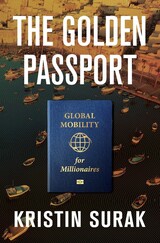
"[A] fascinating study of how people―and their capital―seek to move around a world that is at once hugely interconnected and driven by inequities…definitive, detailed, and unusually nuanced.”
―Atossa Araxia Abrahamian, Foreign Affairs
The first comprehensive on-the-ground investigation of the global market for citizenship, examining the wealthy elites who buy passports, the states and brokers who sell them, and the normalization of a once shadowy practice.
Our lives are in countless ways defined by our citizenship. The country we belong to affects our rights, our travel possibilities, and ultimately our chances in life. Obtaining a new citizenship is rarely easy. But for those with the means—billionaires like Peter Thiel and Jho Low, but also countless unknown multimillionaires—it’s just a question of price.
More than a dozen countries, many of them small islands in the Mediterranean, Caribbean, and South Pacific, sell citizenship to 50,000 people annually. Through six years of fieldwork on four continents, Kristin Surak discovered how the initially dubious sale of passports has transformed into a full-blown citizenship industry that thrives on global inequalities. Some “investor citizens” hope to parlay their new passport into visa-free travel—or use it as a stepping stone to residence in countries like the United States. Other buyers take out a new citizenship as an insurance policy or to escape state control at home. Almost none, though, intend to move to their selected country and live among their new compatriots, whose relationship with these global elites is complex.
A groundbreaking study of a contentious practice that has become popular among the nouveaux riches, The Golden Passport takes readers from the details of the application process to the geopolitical hydraulics of the citizenship industry. It’s a business that thrives on uncertainty and imbalances of power between big, globalized economies and tiny states desperate for investment. In between are the fascinating stories of buyers, brokers, and sellers, all ready to profit from the citizenship trade.
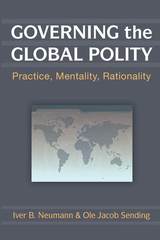
"There have been many attempts to adapt Foucault's arguments to the study of international relations, but this powerful and provocative book is the most sustained, and arguably the most successful in showing how the governmentality approach can be adapted to the analysis of global politics."
---Barry Hindess, Research School of Social Sciences, The Australian National University
A highly welcome and original contribution to contemporary debates on the shape and future of the international system and on the possibility of reconfiguring IR theory as social theory."
---Mathias Albert, Bielefeld University, Germany
"Iver Neumann and Ole Jacob Sending have put meat on the bones of Michel Foucault's notion of governmentality, fulfilling the hopes of long-famished students and scholars of global governance. Through their focus on specific case studies, the authors have provided a much-needed contribution to the international relations literature, one that is sure to become a staple of courses and seminars throughout the world."
---Ronnie D. Lipschutz, University of California, Santa Cruz
What does globalization mean for the principle of state sovereignty and for the power and functioning of states? Whereas realists assert the continued importance of states, constructivists contend that various political entities as well as the logic of globalization itself undermine state sovereignty.
Drawing on the state formation literature and on social theory, particularly the works of Weber and Foucault, Iver B. Neumann and Ole Jacob Sending question the terms of the realist-constructionist debate. Through detailed case studies, they demonstrate that states use nongovernmental organizations and international organizations indirectly to enforce social order and, ultimately, to increase their own power. At the same time, global politics is dominated by a liberal political rationality that states ignore at their peril. While states remain as strong as ever, they operate within a global polity of new hierarchies among states and between states and other actors.
Iver B. Neumann is Director of Research at the Norwegian Institute of International Affairs and Professor of Russian Studies at the University of Oslo.
Ole Jacob Sending is Senior Researcher at the Norwegian Institute of International Affairs, where he heads the Research Programme on Global Governance and International Organizations.
Cover art credit: © iStockphoto.com/Will Evans
Also available as an e-book.

With a comparative, empirical approach, Horton also analyzes dominant practices linked to sustainable development - neoliberal reforms, project interventions, and environmental protection. She reveals how these practices support or undermine economic, cultural, and political opportunities for the rural and indigenous poor and impact these communities' advancement of their own visions of sustainability. Finally, the author explores processes of empowerment that enable communities to articulate and put into practice local visions of sustainability, which contribute toward broader social and structural transformations.
Grassroots Struggles for Sustainability in Central America will interest sociologists, anthropologists, and others who study the theory and practice of sustainable development.
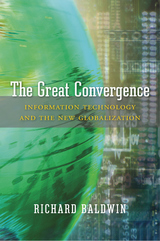
An Economist Best Book of the Year
A Financial Times Best Economics Book of the Year
A Fast Company “7 Books Microsoft CEO Satya Nadella Says You Need to Lead Smarter”
Between 1820 and 1990, the share of world income going to today’s wealthy nations soared from twenty percent to almost seventy. Since then, that share has plummeted to where it was in 1900. As the renowned economist Richard Baldwin reveals, this reversal of fortune reflects a new age of globalization that is drastically different from the old. The nature of globalization has changed, but our thinking about it has not.
Baldwin argues that the New Globalization is driven by knowledge crossing borders, not just goods. That is why its impact is more sudden, more individual, more unpredictable, and more uncontrollable than before—which presents developed nations with unprecedented challenges as they struggle to maintain reliable growth and social cohesion. It is the driving force behind what Baldwin calls “The Great Convergence,” as Asian economies catch up with the West.
“In this brilliant book, Baldwin has succeeded in saying something both new and true about globalization.”
—Martin Wolf, Financial Times
“A very powerful description of the newest phase of globalization.”
—Larry Summers, former U.S. Secretary of the Treasury
“An essential book for understanding how modern trade works via global supply chains. An antidote to the protectionist nonsense being peddled by some politicians today.”
—The Economist
“[An] indispensable guide to understanding how globalization has got us here and where it is likely to take us next.”
—Alan Beattie, Financial Times
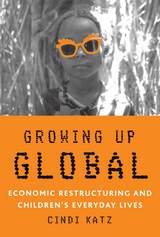
Growing Up Global examines the processes of development and global change through the perspective of children’s lives in two seemingly disparate places: New York City and a village in northern Sudan. At the book’s core is a longitudinal ethnographic study of children growing up in a Sudanese village that was included in a large state-sponsored agricultural program in the year they were born. It follows a small number of children intermittently from ten years of age to early adulthood, concentrating particularly on their work and play, which together trained the children for an agrarian life centered around the family, a life that was quickly becoming obsolete.
Shifting her focus to largely working-class families in New York City in the 1980s and 1990s, Katz is able to expose unsuspected connections with the Sudanese experience in the effects on children of a constantly changing, capitalist environment—the decline of manufacturing jobs and the increase in knowledge-based jobs—in which young people with few skills and stunted educations face bleak employment prospects. In teasing out how “development” transforms the grounds on which these young people come of age, Cindi Katz provides a textured analysis of the importance of knowledge in the ability of people, families, and communities to reproduce themselves and their material social practices over time.
READERS
Browse our collection.
PUBLISHERS
See BiblioVault's publisher services.
STUDENT SERVICES
Files for college accessibility offices.
UChicago Accessibility Resources
home | accessibility | search | about | contact us
BiblioVault ® 2001 - 2024
The University of Chicago Press









